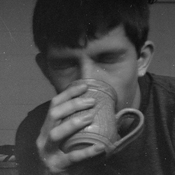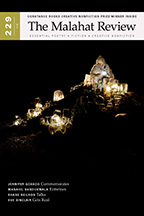The Magic of Ekphrasis: John Stintzi in Conversation with John Reibetanz

Malahat volunteer and reviewer John Stintzi recently spoke with John Reibetanz on his poem, "Fresco Magic," which won the Malahat's 2015 P. K. Page Founders' Award for Poetry. His poem was originally published in Issue 186, Spring 2014.
Roo Borson, the judge of this year's P. K. Page Founders' Award for Poetry, noted that the Greek term “ekphrasis” (which she defines as both “vivid description” as well as writing that focuses on describing and commenting on a specific work of art) could be used as an umbrella theme for both of this year's winners, Jan Zwicky's “Into the Gap” and your “Fresco Magic.” What draws you (and the rest of us) to write through another's art?
I think that one way of answering your question might be to revise the preposition in that last phrase, from “through” to “around.” One of the motives that leads poets to attempt writing ekphrastic poems is the same one that drives other artists to adorn the walls of subway stations or parking garages with graffiti: it’s a feeling that the work as originally conceived is incomplete, from the standpoint of the interloping artist; it could benefit from the introduction of an element that he or she can provide. For the poet, that element is time, the air we mortals breathe. Paintings are overwhelmingly atemporal and spatial, where poetry (rhythmical breathing) brings a sense of temporality, of time passing. Conversely—to change the preposition again—what draws the poet to write to a painting, to want to address it, is that art’s brilliance at capturing still points, quiet moments that are almost unachievable in the course of one’s daily life. So the collaboration of poetry with painting involves a combination of rivalry (I can do that better than you) and envy (wish I could do that as well as you).
You've fallen into my trap! Allow me to continue my pry into ekphrastic writing, since I know you've got a history of it. In your collection Afloat you have a section called “Lament of the Gorges,” which includes several poems based on the photographs from Edward Burtynsky's Three Gorges Dam Project. Between these ekphrastic poems, “Fresco Magic,” and your statement that ekphrastic poetry is an act of completing what the poet feels incomplete, I wonder if you see ekphrastic poetry, also, as a way of speaking through a mediated (and almost “standardized”) version (read also: vision) of reality in order to make a statement, or maybe more aptly an interpretation, that the original artist was unable (or unwilling) to articulate?
I can't help but think the ekphrastic poems of “Lament of the Gorges,” and lines like “the builders not weighed down with all you know / about the heavy rain of pumice that melted roofs” from the Pompeii section of “Fresco Magic” are foreboding and knowing in a way the art itself couldn't (and perhaps wouldn't) necessarily be on its own. Perhaps what I'm trying to ask is this: do you see the work of art you're collaboratively writing around and to foremost as a reinforcement to your poetry (where the art adds the resonance to the poem's interpretations), or the reverse, where the poem is your way of reinforcing the art (where the poem's interpretation and “sense of temporality” add resonance to—completes—the art)?
Let me just say first that if talking about ekphrasis is a trap, it is one I’m very willing to enter, because these days especially you meet such interesting people there. Ekphrastic poems, anthologies, conferences, and studies are widespread in this second decade of the twenty-first century, perhaps in part because the internet has made reproductions of the pictorial images so easily available; so Roo Borson made a point of mentioning that the Silenus image in “Fresco Magic” could be found online. It’s a healthy phenomenon, a democratizing of what was once a province of the well-connected rather than one of connectivity. I think that the relationship between poets and painters is also democratic, rather than one of usurpation in which one art is merely an adjunct or a platform for the other.
So I would answer your question by changing it, as Northrop Frye often used to do, from an either/or to a both/and. I see the practise of ekphrasis as a conversation, in which each voice adds resonance to the other. Each poem or painting takes its place in a kind of perpetual dialogue with the others, rather like what Keats envisions in the last stanza of the “Ode on a Grecian Urn” where the Grecian urn reaches into the past and into the future and converses with the worlds around it. I had a wonderful taste of such collaboration while writing Afloat. The New York artist Amy Epstein read one of the Gorges poems and was moved to paint a watercolour of it; that watercolour became the subject of “A Chinese River in Brooklyn,” in Afloat; and several lines from that poem evoked a second Amy Epstein watercolour. And on it goes, each of us using the lens of our respective art to say “Yes! And also…” in the realization that there will always be more to say.
Ekphrasis are very agreeable traps to fall into. The only sharp bits are the verbs. I like that phrase: “reaches into the past and into the future and converses with the worlds around it.” It seems that's a powerful urge when you decide to do an ekphrastic poem, you want to drag something inevitably past into the now, something you believe should be front and centre. “Make it new,” as Pound said (though he was also a fascist).
I remember trying to do an ekphrastic poem around the hellscape panel of Hieronymus Bosch's The Garden of Earthly Delights because, though 500 years old, it seemed so loud and industrial. It seemed to me to be a very relevant vision. In terms of bringing in the “new,” something that jumped out at me in “Fresco Magic” was the way that you coloured the poem with choice modern details like “Harry-Potter-style” and “too far / from wifi” while talking about frescoes of, well, significant age (one of which being almost 2000 years old). What was it that drew you to bringing forward (to our world of Harry Potter and wifi) these particular frescoes?
Both frescoes, the one at Pompeii and the one at the Villa Cicogna Mozzoni, embody the capacity of art to draw us out of ourselves, beyond the constricting limits of our immediate preoccupations and obsessions. As we immerse ourselves in its scene, the Pompeii fresco turns the urban wall on which it’s been painted into a window, facing us with the landscape beyond it and setting its “lacquered vines” in duet with the “sun-gilded grapes” outside; the villa’s fresco opens up the arcade’s plaster ceiling to disclose a bright sky overhead, deliberately disorienting us and lifting us into a world of unfettered possibility, where the grapes can be either “dangling or levitating” depending on the perspective we choose. Although the past can be a burden (as the Pompeii restorers and as the caretaking Jacopo both know well), both frescoes metaphorically convey the liberating potential of the past. The metaphor here is that of the window rather than the mirror: we look to the past not to find our own image, but to discover other points of reference.
And my concern here is that, even while knowing like Jacopo “the ache of keeping such laddered airiness aloft,” we should cherish these opportunities to put ourselves in touch with the past. As Robert Pogue Harrison notes in his brilliant recent book Juvenescence, “Western civilization as a whole periodically loses its memory, disinherits its past, and surrenders its achievements to ruin,” a risk omnipresent in a culture that thirsts for constant innovation (I, too, eagerly await the next iPhone!). In my poem, those references to Harry Potter and to wifi are invitations to make connections between past and present; ideally, to use their presentness as a means of approaching the discoveries, the uncoverings, of the past.
I think “a world of unfettered possibility” is a very attractive idea. The grapes “dangling or levitating” makes me think of Schroedinger's Cat, the thought experiment illustrating how multiple, opposing possibilities exist at the same time (until the box is opened and the observer finds the cat either dead or alive). It is interesting how many concepts for quantum mechanics can be related to poetry, though in poetry the protons are nouns and the electrons are the verbs. Do you think the language of poetry makes the poem the best vehicle for unfettering possibility? Is there something about poetry's language itself (or perhaps its density) that makes a poem a good envelope for multiple universes to Big Bang around, past and present and impossible at once?
What a great question! Yes, I think it’s the multivalency of poetic language that makes it such a liberating resource. One of my favourite stories about Keats tells how, quarantined off the Italian coast because of a plague scare, he drove his shipmates crazy by punning incessantly: confined on board and faced with the ultimate confinement of terminal illness, he turned to language for release, for its affirmation of multiple possibilities and of creative potential. I’ve found David Bohm’s writings on quantum physics similarly liberating, even given my limited scientific aptitude, because they posit a universe in which subject and object, energy and matter, are constantly seeking new patterns of recombination, resisting final definition.
For the poet, the use of language—the English language especially, with its rich history of mixed sources—involves such an ongoing dialogue between (to return to the previous question!) the present and the past. And one of the formal challenges I’ve tried to tackle recently is to find ways of including the reader more fully in that dialogue. “Fresco Magic” and its siblings represent an attempt to develop a more flexible prosody that will encourage a more active participation on the part of the reader—Aurora and the other figures “winking at you to join in the dance.” The substitution of music-like rests for punctuation opens up possibilities of association between phrases: does this group of words follow immediately from what’s come before, does it introduce a new thought that’s going to be elaborated in the following words, or does it do both? Rather than sit back and float along on the experience of the poem, the reader is asked to do more active swimming in the hope that, like Jacopo’s efforts, hers will be more rewarding, perhaps (to paraphrase the poem) “because more exposed.”
That story about Keats is perfect. I wish that I had that kind of excuse for my obscene punning. But I really appreciate how you are consciously trying to add room in the poem for the reader to participate. Wasn't it Wordsworth that said we half-create the world? It's as if you're trying to get your poems to be like the art they are conversing with, incomplete until the reader arrives to make the final say: levitating or not. It's been clear throughout this whole interview that you're very consciously democratic in your writing, and that you weave in a lot of openings into your poetry (even formally with your lines' blank-space caesuras). Your poems, particularly “Fresco Magic,” act as little agoras where every dialogue is open-minded and eager for conversation, where any mind—little or large—can wander over and discuss any topic, from frescoes to wifi to quantum mechanics.
Your poems and you have that trait in common. So once again I'd like to congratulate you on your 2015 Founders' Award win for “Fresco Magic.” I'm honoured to have been gifted the time and space for my mind to wander into your agora and participate in this dialogue. Any final words? A pithy aphorism to close down the day?
I won: I’ve been twice honoured—by the award, and by the opportunity to participate in this conversation with you. As for pithy aphorisms, let’s allow Frost to have the last word on all such conversations: “We dance round in a ring and suppose, / But the Secret sits in the middle and knows.”

John Stintzi
* * * * * * * *









